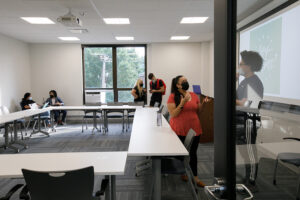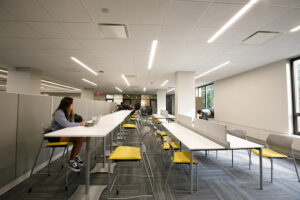The Right Place for Student Success
1/13/2022
This story originally appeared in the 2021 Annual Report.
Mount Saint Vincent has an enduring and celebrated history as an institution committed to serving the needs of each and every student to walk through the campus gate on the corner of 263rd Street and Riverdale Avenue.
Part of that commitment to teaching and learning has been what President Susan R. Burns refers to as “meeting students when and where they need us.” Higher education faces a challenging shift in climate as we begin to redefine what is referred to as the “traditional” college student to include a network of diverse cultural, socioeconomic, and religious backgrounds. It’s time for colleges and universities across the country to stop counting on students to adapt to an antiquated education system and begin actively providing learners with the academic and advising supports they need for achievement and retention.
To no surprise, Mount Saint Vincent has been a frontrunner in creating that path to graduation for generations of students. Even as the College continues to grow, develop, and expand, serving the needs of our students remains paramount. More and more learners from diverse communities dream of earning a degree and the Mount has become an engine for turning those dreams into a reality.
That success has been due in part to the Mount’s vibrant network of student support services. With a mission of helping to develop the whole person, advisors challenge their students to exercise their minds, as well as their hearts. Mount Saint Vincent pushes learners to pursue their passions, while providing them with step-by-step guidance to set a plan and see it through.
We meet our students when and where they need us.

That’s why, in an effort to expand our resources and facilities, the second floor of the Elizabeth Ann Seton Library has been transformed into an integrated student support, tutoring, and study environment—ready and equipped to house the Oxley Integrated Advising Program, the Academic Resource Center, and the slate of Mount Pathways Programs: HEOP, TRiO, and MAP.
“The renovated space in the Elizabeth Ann Seton Library is the epicenter of academic advising and support on campus,” said Dr. Burns. It makes an exceptional education not only possible, but attainable for both current students and generations of those to come. Resources located in the new space, coupled with our dedicated staff members and advisors in Academic Affairs, provide all students—regardless of family background or need—with the environment and support they need to thrive.”
The library is now the new home of our Oxley Integrated Advising Program, which oversees advising and academic resources on campus. Named for alumna Geraldine Motta Oxley ’51, an insurance industry pioneer and generous benefactor of the College, the program leads the region in career education—earning recognition year after year from Colleges of Distinction in the career development category. Advisors in the Oxley Program help students appreciate their strengths and interests, understand the value and range of opportunities associated with their strengths, and strategize how to translate what they love into a meaningful career.
It’s an ambitious goal, but members of the Mount community are strongly committed to helping students develop into scholars and leaders both on campus and beyond.
Advising at Mount Saint Vincent is two-fold. Not only are students paired with an academic advisor from the faculty to help guide their study of a particular major or field of study, students are also paired with a career advisor from the Oxley Program—who closely follows each student throughout his or her four years of study and offers invaluable advice in career development, internship opportunities, and graduate school applications.
“The Oxley Integrating Advising Program is unique. Support for our students begins at orientation and continues through graduation—and even beyond. Oxley advisors encourage their students to explore, expand, and excel as they select their courses and a field of study, consider internships, and apply for jobs or graduate school. There’s no other program like it in the nation—the Oxley Program is a catalyst for student support and success.”
— Dr. Gabrielle Occhiogrosso, Dean of the Undergraduate College
Returning to the library in its updated space is the College’s Academic Resource Center, or ARC. The ARC provides individualized or small group tutoring to all enrolled students at the College. Students can meet with a peer or professional tutor to review course content and papers, prepare for classwork or tests, learn note-taking and textbook reading techniques, and organize projects. The ARC also offers specialty workshops, writing support, and reinforcement of study skills. It is a major agent of student success on campus, aiding students across the disciplines with the assistance they need to flourish in their classes.
Tutoring services in the ARC are based on flexible scheduling and are free of charge for all students, meaning learners at the College are not limited by their individualized financial restrictions to gain the help they need.
 And joining the Oxley Integrated Advising Program and Academic Resource Center are the three Mount Pathways Programs. Seeking to offer access to an exceptional higher education for every motivated student, the Mount is a pathway to opportunity. The Mount Pathways Programs open doors for students from groups typically underserved by higher education or who might otherwise not have the possibility of a true college experience. With a goal of offering a truly authentic and accessible education, the HEOP, TRiO, and MAP programs afford students from a multitude of cultural, racial, socioeconomic, and ability backgrounds with the support they need to complete their degrees.
And joining the Oxley Integrated Advising Program and Academic Resource Center are the three Mount Pathways Programs. Seeking to offer access to an exceptional higher education for every motivated student, the Mount is a pathway to opportunity. The Mount Pathways Programs open doors for students from groups typically underserved by higher education or who might otherwise not have the possibility of a true college experience. With a goal of offering a truly authentic and accessible education, the HEOP, TRiO, and MAP programs afford students from a multitude of cultural, racial, socioeconomic, and ability backgrounds with the support they need to complete their degrees.
The Arthur O. Eve Higher Education Opportunity Program—or HEOP, for short—is a partnership with the New York State Education Department that is designed for students who have the potential and drive to further their education, but due to academic vulnerabilities in high school and a lack of financial resources, would not otherwise have the opportunity to attend college. The Mount’s HEOP program, funded in part through a grant from New York State, is one of the largest in the state per capita, with participants accounting for approximately ten percent of all undergraduate students.
“The Higher Education Opportunity Program is critical for maintaining enrollment and preventing attrition among students who had limited academic resources before coming to college. Advisors for HEOP meet with their students all throughout the academic year—offering academic, financial, and career counseling as well as personal advisement. Through their interactions with advisors, professors, and peers, students build a sense of community and they quickly realize that success, at the Mount and beyond, is theirs to seize.”
— Marlene Gonzalez, Director for HEOP
HEOP students benefit in an array of academic and personal supports in order to make the transition to college less strenuous. Engagement with HEOP programs begins prior to the start of students’ first year of study with a summer enrichment program and continues throughout the next four years. HEOP participants are placed in cohorts, which encourages a dynamic community of learners eager to develop critically important skills in the classroom and beyond—as well as strong relationships with peers, advisors, and members of the faculty.
 Similar to HEOP, the TRiO Student Support Services program has a goal of improving the retention of first-generation, low-income learners at the College. Sponsored by a federally-funded grant from the U.S. Department of Education, the TRiO program has been a hallmark of student support on campus since 1997. TRiO serves students who are at a disadvantage, either economically or culturally as the first in their families to attend college, or who have been diagnosed with a disability. Advisors provide personal counseling, career advisement, tutoring, mentoring, leadership development, and a wide array of educational enrichment activities.
Similar to HEOP, the TRiO Student Support Services program has a goal of improving the retention of first-generation, low-income learners at the College. Sponsored by a federally-funded grant from the U.S. Department of Education, the TRiO program has been a hallmark of student support on campus since 1997. TRiO serves students who are at a disadvantage, either economically or culturally as the first in their families to attend college, or who have been diagnosed with a disability. Advisors provide personal counseling, career advisement, tutoring, mentoring, leadership development, and a wide array of educational enrichment activities.
The TRiO program also features a summer program, which benefits both incoming first-year students and upperclassmen TRiO scholars. New students have the opportunity to engage in a week-long series of academic, personal, and cultural workshops, as well as social activities that facilitate a successful transition into college. Through peer mentoring positions, upperclassmen are able to develop confidence, decision-making, and professional skills as they lead their peers throughout the summer program.
“The TRiO summer program lays the groundwork for success and achievement as TRiO scholars make the daunting transition from high school to college. It offers participants the opportunity to become familiar with the campus and features workshops that are designed to strengthen students’ self-efficacy, broaden their perspectives, and help them foster relationships with a variety of staff, students, and faculty.”
— Jason Castillo, Director for the TRiO Program
The third Mount Pathways program, MAP—or the Mount Access Program—is designed for students who demonstrate the potential and motivation to succeed in college, but whose SAT/ACT scores and high school records are below the normal admission requirements for enrollment at the Mount. Many, if not all, MAP students would not have otherwise continued their education past high school. Through the program, learners are guided through their four years of study in an established network of developmental learning cohorts, and eventually branch out to pursue a full academic program in any of the College’s array of majors.
Like HEOP and TRiO, the MAP program also boasts a robust summer enrichment program for first-year students and upperclassmen. MAP scholars will create a Success Action Plan in their first year of study to help them improve their study habits, time management, and note-taking skills. And students admitted to MAP are selected not only for what they may expect to gain as a fully-engaged student on campus, but also for what they can contribute to our local community.
“MAP scholars come to the Mount with a goal and a dream of pursuing a college education. MAP students who participate in the summer program are, statistically, more prepared as they begin their first semester. And beyond the summer, MAP scholars are grouped into learning communities—where select courses are taken alongside other MAP students, designated MAP faculty members, and tutoring services through the ARC. They are given every resource needed to excel in the classroom and beyond”
— Jordan Anderson, Director for the Mount Access Program
Seeking to offer access to an exceptional education for every motivated student, these Pathway Programs afford students—from a multitude of cultural, racial, socioeconomic, and ability backgrounds—the support needed to complete their degrees. At the Mount, success is theirs to seize.
 The renovated library space includes offices for advisors and Academic Affairs staff members, computer labs, quiet study spaces, and student lounges. These areas will make it possible for students in the Mount Pathways Programs and beyond to have a safe space to study, grow, and thrive among the College community. All Mount students are ambitious and determined, and the sacrifices many of their families make to send their children to college will no longer be a factor in stifling our students dreams and passions.
The renovated library space includes offices for advisors and Academic Affairs staff members, computer labs, quiet study spaces, and student lounges. These areas will make it possible for students in the Mount Pathways Programs and beyond to have a safe space to study, grow, and thrive among the College community. All Mount students are ambitious and determined, and the sacrifices many of their families make to send their children to college will no longer be a factor in stifling our students dreams and passions.
The library renovation project was largely funded in part by a New York State and Municipal Facilities Grant—which was secured through the advocacy of New York State Senator Alessandra Biaggi. The grant, totaling $500,000, will be combined with funds from the estate of alumna Helen Stafford Curry ’35. Throughout her lifetime, Helen was strongly committed to student success and upward mobility at the Mount. She funded the development of the Curry Center in Founders Hall—a student-centered “one-stop-shop” for the Registrar’s Office, Bursar, and Financial Aid—and has contributed a generous amount of money to establish the Saint Vincent’s SAFE Fund, an endowment that provides the College a resource to assist students in crisis or with emergency needs. Coupled with Senator Biaggi’s commitment to advancement in higher education, the space makes tangible Helen’s vision for attrition management and retention at her alma mater—and is a further extension of the College’s mission.
“The Mount’s mission and values call us to meet learners when and where they need us. Living that mission means more than just offering longer office hours or extra credit sessions. It means deeply listening to our students when they’re struggling, celebrating with them when they accomplish a goal, and helping them develop a plan to achieve their personal and professional dreams—and put that plan into action. Our newly designed space in the Elizabeth Ann Seton Library has been intentionally reimagined to encourage students, faculty, staff, and administrators to interact with each other in a way that allows for the development of meaningful relationships that we know are critical to learners’ success, in and beyond the classroom.”
— President Susan R. Burns, Ph.D.
About the University of Mount Saint Vincent
Founded in 1847 by the Sisters of Charity, the University of Mount Saint Vincent offers nationally recognized liberal arts education and a select array of professional fields of study on a landmark campus overlooking the Hudson River. Committed to the education of the whole person, and enriched by the unparalleled cultural, educational, and career opportunities of New York City, the College equips students with the knowledge, skills, and experiences necessary for lives of achievement, professional accomplishment and leadership in the 21st century.
